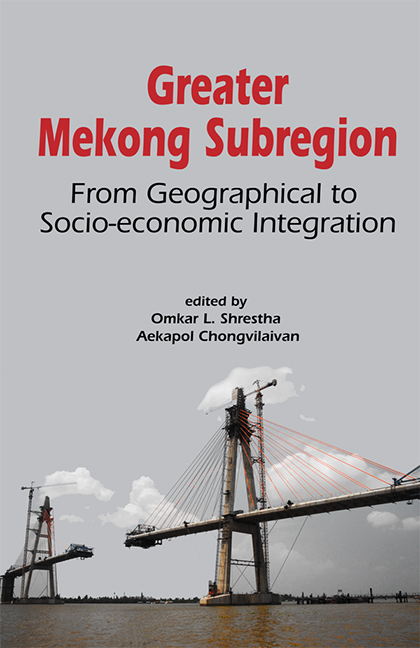Book contents
- Frontmatter
- Contents
- Preface
- List of Abbreviations
- Contributors
- 1 Greater Mekong Subregion: From Geographical Corridors to Socio-economic Corridors
- 2 Cambodia, Its Development, and Integration into the GMS: A Work in Progress
- 3 Subregional Connectivity in the Lao PDR: From Land-locked Disadvantage to Land-linked Advantage
- 4 The Economic Development of Myanmar and the Relevance of the Greater Mekong Subregion
- 5 GMS Challenges for Thailand
- 6 Deepening GMS Cooperation in a More Integrated ASEAN and East Asia
- 7 China (Yunnan)–GMS Economic Cooperation: New Development and New Problems
- 8 Trade and Investment in the Greater Mekong Subregion: Remaining Challenges and the Unfinished Policy Agenda
- 9 Enhancing Financial Cooperation among the GMS Countries
- 10 The Challenges of GMS Regional Integration: Case Study of Governance of the Logistics Industry in Thailand
- 11 Energy Sector Integration for Low-carbon Development in the GMS: Towards a Model of South-South Cooperation
- 12 Linking the Social to the Economic: Broadened Ambitions and Multiple Mitigations in New Mekong Corridors
- Index
11 - Energy Sector Integration for Low-carbon Development in the GMS: Towards a Model of South-South Cooperation
Published online by Cambridge University Press: 21 October 2015
- Frontmatter
- Contents
- Preface
- List of Abbreviations
- Contributors
- 1 Greater Mekong Subregion: From Geographical Corridors to Socio-economic Corridors
- 2 Cambodia, Its Development, and Integration into the GMS: A Work in Progress
- 3 Subregional Connectivity in the Lao PDR: From Land-locked Disadvantage to Land-linked Advantage
- 4 The Economic Development of Myanmar and the Relevance of the Greater Mekong Subregion
- 5 GMS Challenges for Thailand
- 6 Deepening GMS Cooperation in a More Integrated ASEAN and East Asia
- 7 China (Yunnan)–GMS Economic Cooperation: New Development and New Problems
- 8 Trade and Investment in the Greater Mekong Subregion: Remaining Challenges and the Unfinished Policy Agenda
- 9 Enhancing Financial Cooperation among the GMS Countries
- 10 The Challenges of GMS Regional Integration: Case Study of Governance of the Logistics Industry in Thailand
- 11 Energy Sector Integration for Low-carbon Development in the GMS: Towards a Model of South-South Cooperation
- 12 Linking the Social to the Economic: Broadened Ambitions and Multiple Mitigations in New Mekong Corridors
- Index
Summary
The Greater Mekong Subregion (GMS) comprises Cambodia, the People's Republic of China (PRC), Lao People's Democratic Republic (Lao PDR), Myanmar, Thailand, and Vietnam. In 1992, with the Asian Development Bank (ADB)'s assistance, the six countries entered into a programme of subregional economic cooperation designed to enhance economic relations among the countries. The establishment of an integrated subregional electric power market is a major component of the economic cooperation of the GMS countries.
When the idea of the subregional power market was first conceived in the early 1990s, the main concern was to ensure an adequate energy supply at the least cost to meet the requirements of economic development in the subregion, which is one of the fastest growing areas in the world. As the subregional power sector integration gradually takes shape amid growing international concerns on climate change, the GMS countries have come to realize that cooperation in the energy sector is also an effective way to achieve low carbon development in the subregion. To this end, the GMS countries decided to expand their cooperation in the energy sector to include energy efficiency, renewable energy, and clean fuels.
On the basis of an overview of the current status of the energy sector integration, particularly in the power sector of the GMS countries, this chapter analyses the potential for carbon emissions reduction in the GMS countries through subregional cooperation. In particular, the GMS cooperation model in the energy sector is proposed as one of the means of addressing global climate change.
Current Status of Power Interconnection and Energy Sector Cooperation in the GMS
The GMS has diverse energy resources that are unevenly distributed among its member countries. Although the subregion is well endowed with hydropower and fossil fuel resources, most of the exploitable resources are concentrated locally. Hydropower resources are abundant in the Lao PDR, Myanmar, and Yunnan, PRC, and are expected to exceed their own demands for the foreseeable future. Most of the fossil fuel resources (oil and gas) are in Yunnan, PRC, and Myanmar, and, to a lesser extent, in Vietnam. Thailand has limited domestic gas and oil reserves, and the country is expected to rely on imports for its future energy needs.
- Type
- Chapter
- Information
- Greater Mekong SubregionFrom Geographical to Socio-economic Integration, pp. 216 - 232Publisher: ISEAS–Yusof Ishak InstitutePrint publication year: 2013



